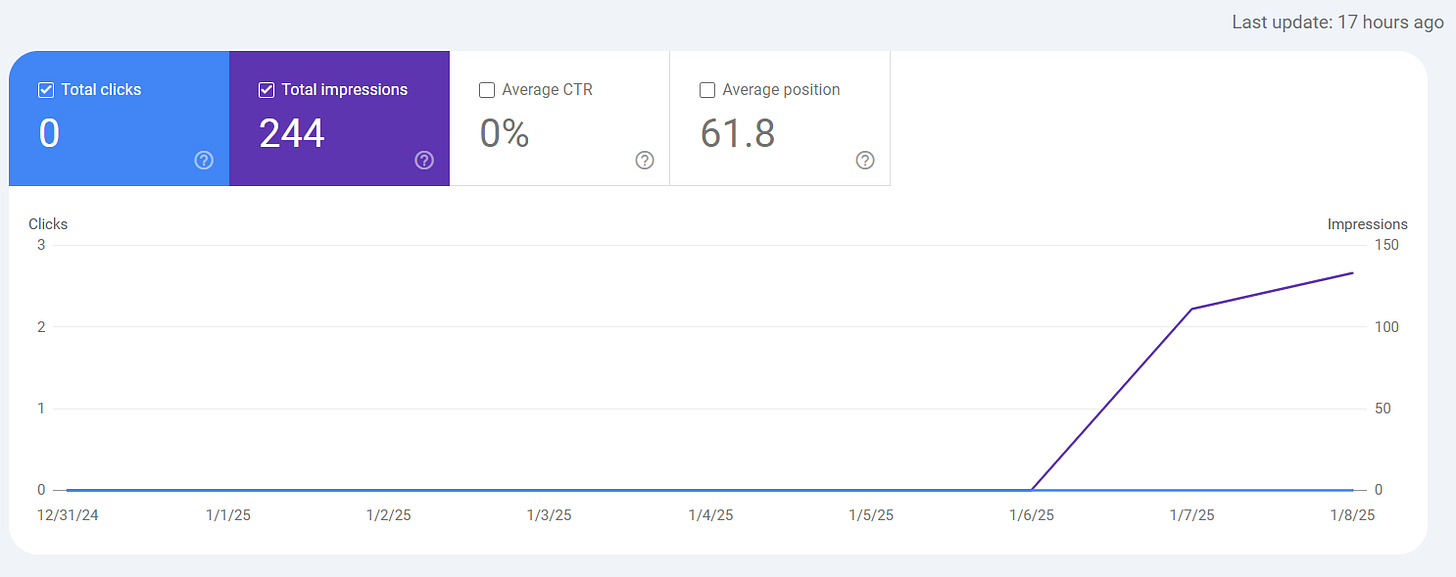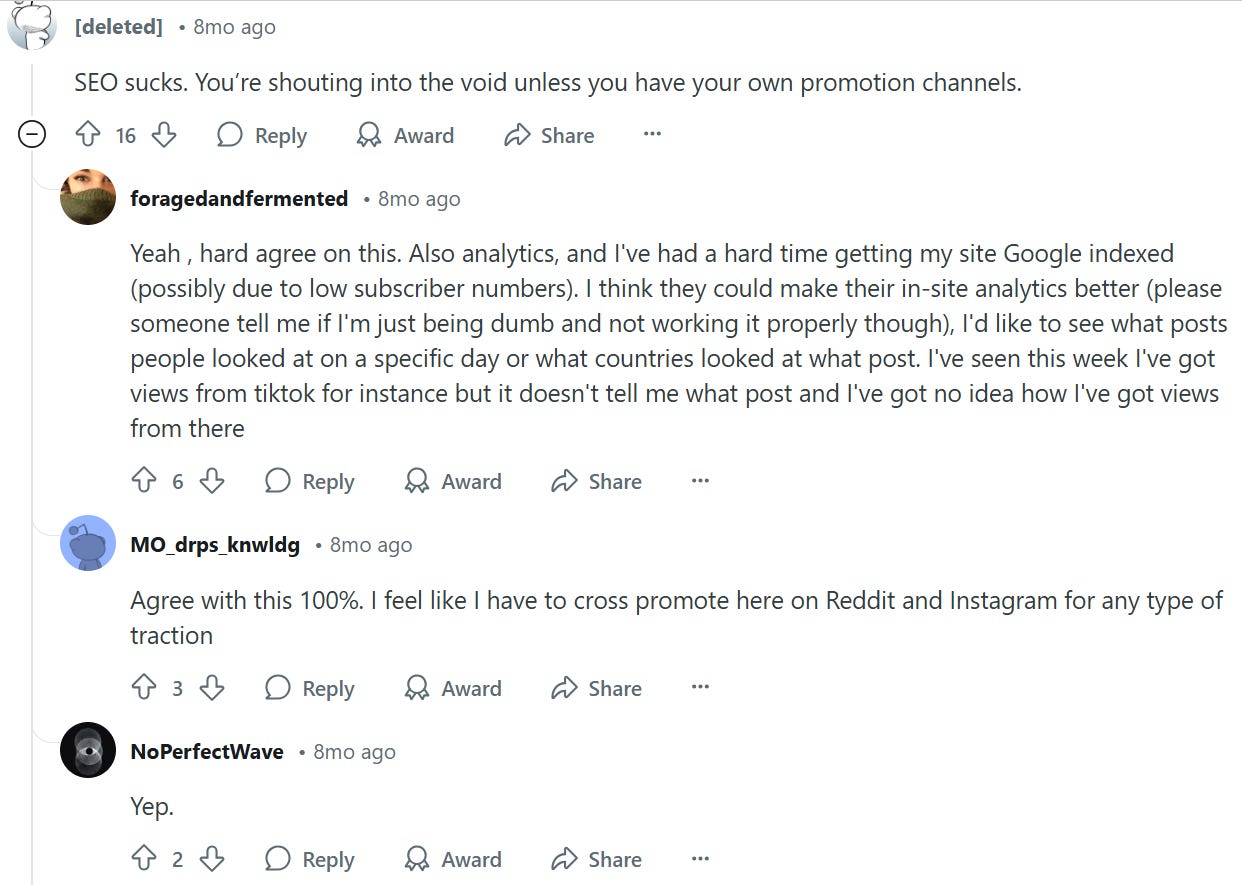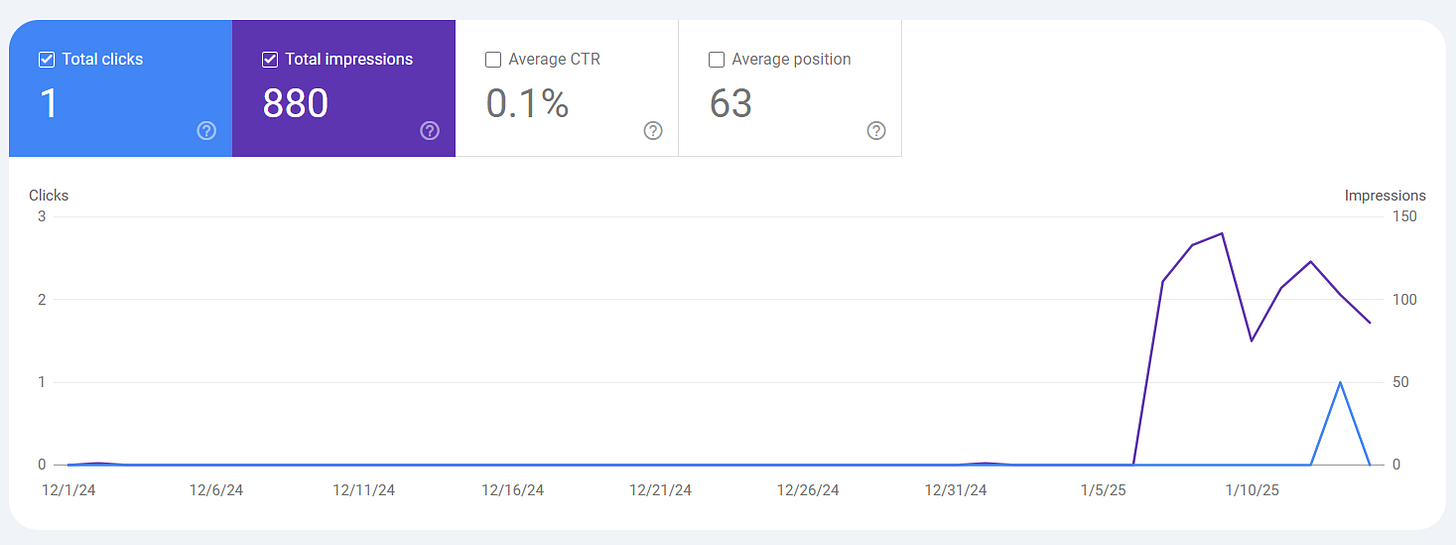Is Substack Bad for SEO? A Progress Check
Tracking the SEO results for this Substack publication.
Does Substack’s SEO reputation really live up to the complaints—or is it just misunderstood?
I’m on a mission to determine whether or not Substack is bad for SEO (search engine optimization). At least, as bad as some people seem to think it is.
We’re in the midst of a huge transition for writers, authors, creators, and makers (what I’ve come to call collectively as Synthesizers). As AI begins to infiltrate and permeate our world, barring some legal issue, it is inescapable.
AI will soon be baked into everything. The face of search engines will change has changed and along with it, the fate of anyone who creates content or digital products. As a serial Synthesizer myself, I know I need to be aware of the changes that are happening. Adapt or die.
There’s another change that’s been happening for the last few years that’s relevant. That is the resurgence of the newsletter, but in it’s more modern form.
Newsletters are the new blogs, and Synthesizers are flocking to platforms like Substack, Beehiiv, and Ghost to take advantage of what these new platforms can do for them.
And blogs, as history has shown, deserve to be loved by search engines.
If I’m going to use Substack, I want to know if it can hang with others. Substack SEO bashing seems rampant, but I’ve just seen my first glimmer of good news my Google Search Console.
What is SEO?
In case you’re not up on all the acronyms, SEO stands for search engine optimization.
Search engine optimization (SEO) is the process of improving the quality and quantity of website traffic to a website or a web page from search engines.
Why is this important?
Because growth is often slow and painful. If you’re not optimizing your Substack to get more traffic from search engines, you’re missing out on thousands of visitors. It could greatly benefit you to optimize your Substack.
The problem with SEO is it can be like golden handcuffs.
The Google dance is real. When search engines update, they can leave you high and dry. I lost over 90,000 page views per month to one site on one Google update (the horribly named, Penguin). I’ll talk about how to think about the Google dance below.
Are the Complaints Even Valid?
I’ve seen quite a few complaints about how Substack sucks for SEO. The reason(s) often given?
Substack is primarily a newsletter platform so therefore it’s not optimized for SEO.
Substack’s SEO configuration options are limited and this limits its ability to be found in search engines.
Safe to say, the overall assumption by the complainers is it isn’t optimized for SEO.
This is BS and seems like a gut reaction.
The truth is, though, the bashers are right. In part. Substack does have limited options when it comes to schema and some other features. If you’re coming from WordPress or another platform where there’s more control, it can feel very limiting. I get that.
But to say that Substack is somehow inherently bad for SEO seems a stretch.
Complaints often make their way into online discussions, such as this Reddit thread where users shared frustrations about Substack's SEO.
SEO sucks. You’re shouting into the void unless you have your own promotion channels.
It sounds like some people aren’t seeing the results they want, and they’re blaming the platform. More likely, it’s lack of focus, lack of technical skill, and lack of optimization.
My response: if you want search traffic, you have to do the work. The platform isn’t going to do it for you.
And let’s face it, many newsletter creators don’t care about SEO. They’re not even thinking about getting search engine traffic, they just want to write. Fair enough, but let’s not be so quick to blame the platform.
Others have speculated that Substack doesn’t want to pay the operating costs for free search engine traffic to your newsletter. That is absurd.
According to Substack, they want the search engine traffic.
At Substack, we do a number of things behind the scenes to ensure that all publications are indexed and ranked well in search engines.
And why wouldn’t they? The more traffic, the more free subscribers, and the more subscribers, the more chances for paid subscribers. That is currently how Substack generates revenue, so it makes perfect sense they’d want more traffic.
I know for a fact that some Substackers are not following even this basic guide to SEO on Substack for their publications. If they put more effort into it, they might see better results.
I’ve worked the technical side of many platforms and websites. That includes newsletter/email marketing, blogs, static sites, and e-commerce. I’m used to navigating the differences. I’m also familiar with the resulting frustration and the need to create some workarounds.
In some cases, when others have said that such-and-such platform is not good for SEO, on closer inspection what they really meant was either:
It’s weird: It’s different from what they were familiar with and weren’t sure how to handle it.
My little brother ate my homework: They didn’t get the results they wanted because [insert specific platform reason to put the blame on here].
It often came down to skill set, familiarity, and frankly, just good old trial and error.
My sense is that Substack is about as good for SEO as any other single-author site where you have to build an audience and backlinks for yourself. I could be wrong.
All that being said, you can imagine how excited I was to see some SEO activity going on with my Substack. In the beginning of January, 2025, I started to see the first signs of life from Google—impressions!
No clicks, but that’s normal with a high average position (60+) and a newer site. The good news is that if you can come in under position 100 so soon in the game (about 4 months), it’s a great indicator.
This activity is all coming from a single post that went live just a few days before. With only 8 posts on the site and almost no active backlinking activities, this is all good news. If I can increase the frequency of the posts, I should do better.
All this is well and good, but I’m just one case. So the question remains…
Is Substack Bad for SEO?
For my publication, only time will tell. I haven’t seen any case studies or comparative analysis that prove it’s any worse than any other platform. None of the complaints I’ve seen have any hard data that I could see.
I’d like it if Substack gave me more control over some of the technical SEO aspects. The reality is, though, the core of an SEO strategy still comes down to 2 major things:
Content
Backlinks
Agonizing over things like keyword density and all the stuff SEO nerds get bogged down in is interesting. It may also be helpful. But at the end of the day, content and backlinks are of great importance, and everything else is less so.
Overall, I’m skeptical but optimistic, given what I’ve seen.
I revisited my Google Search Console dashboard to see how it was doing, and I have to say, I’m pleased. We have a higher average position (63) and many of the keywords are irrelevant, but that is expected this early on.
We even had a click! 880 impressions, 1 click:
My Substack SEO Plan
Since newsletters are the new blogs, treating Substack like a blog when it comes to gaining search engine love makes total sense. Nothing lives in a vacuum and plans don’t work in isolation, so we hybridize and adapt.
The SEO plan for this newsletter, at least for the short term:
Keep posting blog-like long form content on topics in the niche.
Follow very basic on page and onsite SEO best practices with a light touch.
Don’t overoptimize the site or the posts.
Switch to a custom domain and get some exposure on other platforms.
Build specific pages that will attract links (guides, tools, etc.).
Create a “Start Here” landing page as a post.
More internal linking.
Essentially, a simple content marketing plan you’d use for a blog. More details of the plan will unfold as time goes on.
Switching to a custom domain is on my mind, but it may create a temporary setback. Having your own domain is a long term play and provides more control while mitigating risk.
There is competition in my niche for sure, some of it on blogs with thousands of pages and lots of backlinks. Still, I feel I can make some inroads and get some search traffic.
For the record:
I’ve done only very light keyword research using mostly free tools, primarily as a check against my gut about content choices.
I’ve not made any effort to build links or promote other than 1) a Reddit account with a link to my newsletter as user flair in a subreddit and 2) Substack Notes.
In other words, the SEO part of this has not been a heavy lift or required a lot of time.
So what about keywords?
I haven't been overly concerned about keywords so far and been somewhat loose. Same for the post slugs/URLs. This is the opposite of what I normally do. I need to get deeper into keyword research and start hitting that instead of going with my gut.
If you’d like to follow my journey, please subscribe. You’ll get to see the results of this SEO experiment and the other experiments I run in self-publishing and online marketing.
Next Steps for Substack SEO Success
Want to grow your Substack and make SEO work for you? Here's the plan:
Mix Blog and Newsletter Strategies:
Combine blog-like promotion techniques and SEO friendly content with your newsletter subscriber growth for a hybrid approach. Think of SEO as a growth booster, not the only engine.Build Independence from Google:
Increasing subscriptions is the main goal. As your subscriber base grows, you’ll rely less on Google’s whims (and not worry so much about losing 90,000 page views the way I did). Use SEO as a tool and prevent the golden handcuffs.Work the Platform, Not Just the Tools:
Substack's technical SEO is solid enough—it’s how you leverage it that counts. Speaking of that, here’s how to fix your Substack Notes feed and find the right people to follow.Test, Measure, Adapt:
What can be measured can be improved. Use data for decisions. Track your results via Google Search Console and connect your Substack to Google Analytics, adjust your strategy as needed, and let the numbers guide you.Watch for Platform Updates:
Substack is evolving. Who knows? In six months, it might become even more SEO-friendly. Stay tuned.
Remember how I mentioned losing 90,000 page views per month due to a Google update? Focus on subscriber growth and you’ll reduce the impact of those kinds of changes.
Plans are great, essential even, but the real test is in the doing. And let’s not forget, with generative AI on the rise, there is a sense of urgency here.
Content creators are going to be pinched from multiple sides:
Generative AI: AI assisted and AI generated content produces content at speed, and the quality will only get better.
AI Search: In the old days we used directories to find sites and information. Then came search engines and then Google’s algorithm changed the game. Now, algorithm-based search is being augmented by AI-based search.
Just as we were warned, searchers sometimes don’t even need to leave Google to get their answers. Where does that leave the content creator?
Serve your audience, keep up, build an email list, or get left behind. It’s your best hedge against change.
I'll continue tracking progress, experimenting, tweaking the plan, and sharing what works. Subscribe and follow along—together, we’ll figure out what sticks. LFG. 🔥







I've been in the blogging/seo world a long time and have seen Google decimate various platforms - I'm actually kind of encouraged that we aren't seeing tons of substack content taking over google - after watching Squidoo and Pinterest (specifically) get wiped out by too much google attention too quickly - It's nice to see this being a slower more intentional influx of content into the search engine.
a note on custom domains - if you have a custom domain you can't hyperlink it in notes. Not a commentary on whether or not to do that just information. if discovered.
Thanks for the link to the guide on SEO. I need to work on this.